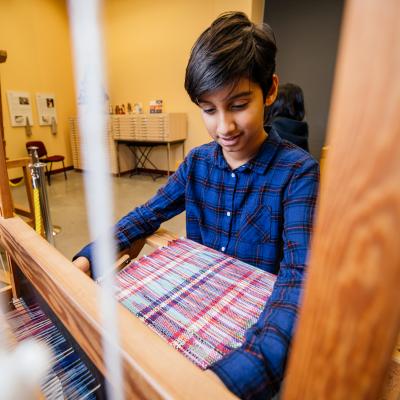
Find out more about the textile centre, a unique feature of the Museum of Surrey.
Explore the Textile Centre at Museum of Surrey
The Textile Centre at Museum of Surrey is a dynamic space dedicated to the rich traditions and skills of fibre arts. Whether you’re looking to learn a new craft, explore cultural displays, or immerse yourself in the history of textiles, there’s something here for everyone.
Programs and workshops
Discover your passion for textile arts.
Textile programs for all ages
Explore a variety of registered programs for preschoolers, children, and adults, including:
- Knitting, Sewing, Weaving
- Crocheting, Felting, Spinning
- And more!
Register:
Craft It With Wool - Preschool
Kids Can Sew: Hand Sewing - Children
Textile talks and presentations
Join professional speakers in the museum theatre for engaging talks on textile-related topics. Registration required.
The Textile Studio
Our Textile Studio is a creative hub where visitors can watch live demonstrations, participate in hands-on activities, and even try weaving.
Drop-in access
Open during special events and when staff or volunteers are present.
Experiences at the studio
Fibre arts demonstrations: Watch live knitting, spinning, and weaving.
Hands-on opportunities: Try your hand at weaving on our public loom, or participate in seasonal crafts.
Historic Jacquard Loom: See this unique artifact up close, with demonstrations by our knowledgeable volunteers when available.
Display cabinet: View beautiful woven pieces from Surrey weaver Honey Hooser’s collection.
Cultural exhibits: Special exhibitions and displays aligned with cultural events, such as Filipino Fest and Celtic Fest.
Hooser Textile Library
Explore an extensive library and display of Indigenous textile tools and artifacts.
Library collection
Open on select event days or by appointment with the Textile Specialist. This collection, donated by Honey Hooser’s son, Doug, includes her personal collection of textile books.
Textile teaching collection
View Indigenous textile tools and artifacts that highlight traditional techniques and artistry.
Textile tours
Discover the magic of textiles on a guided tour, tailored for various groups and interests.
Tailored textile tours
Book a 1-hour paid tour for groups of seniors, children, fibre arts groups, or students. Tours are adaptable to suit different age groups and interests.
Textile Dye Garden
Discover the art of natural dyeing in our Textile Dye Garden, open seasonally.
Dye Garden open house
Held for one day during spring, summer, and fall, with opportunities to:
- Take guided tours of the garden
- Engage in family-friendly activities
- View dye samples and textile fibres
- See demonstrations of weaving and spinning, led by volunteers when available
Garden volunteer program
Join our dedicated garden team to help grow and maintain the dye garden.

Special events and exhibit openings
Celebrate with us during exhibit openings and special city-wide events.
Exhibit openings
We support exhibit launches with complementary textile displays and demonstrations.
Offsite events
Find Textile Centre staff at Surrey-wide events, such as:
- Seniors Forum
- Party for the Planet
- National Indigenous Peoples Day
- Fibres West – Fibre Arts Fair
Who are the Hoosers?
The amazing Honey Hooser! The centre is named after her because her son donated her extensive textile collection to the museum in 1984. As a local weaving expert and mentor, Honey used her craft to help special needs people, including badly injured soldiers after WWII.
Weaving was a family affair for the Hoosers, with Arthur Hooser and their sons building looms for Honey and the people she worked with. Among Honey’s many accomplishments was one of her hand woven skirts in a layette given to Queen Elizabeth for the birth of Princess Anne.
The Jacquard Loom
The first of its kind was created in France in 1804 using a punch card method to create intricate patterns. Would you believe these repeating patterns were the inspiration for computer hardware? It’s true! Honey Hooser brought it back from Europe in the 50s and now this masterpiece lives in the museum for visitors to behold.

